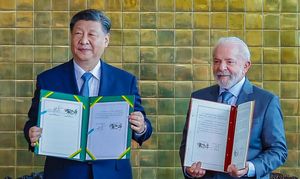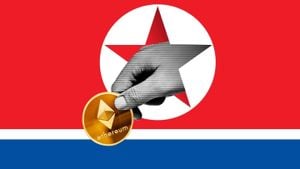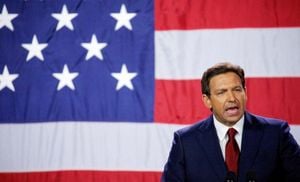Elon Musk and Jeff Bezos, two of the wealthiest individuals on the planet, have engaged once again in their long-standing rivalry, this time centering on the assertion of financial maneuverings related to Trump’s political future. Their conflict reignited when Musk claimed—through his platform, X—that Bezos had advised investors to sell their Tesla and SpaceX shares, predicting doom for Donald Trump’s prospects in the upcoming presidential election.
Musk's provocative post sent ripples through both political and financial circles. He stated, "I just learned tonight at Mar-a-Lago," indicating his proximity to Trump’s inner circle, presumably referring to the former president's Florida estate, where he has been increasingly visible since Trump's return to political contention.
Bezos wasted no time refuting Musk’s claims, taking to X to succinctly declare, "Nope. 100% not true." This sharp rebuttal highlights the tense and competitive nature of their relationship, especially considering the magnitude of their respective companies—Tesla and Amazon—and the influence they wielded over the tech industry.
The origins of this feud trace back several years, as both men have jockeyed for the title of the world’s richest person, with their combined wealth exceeding $500 billion. According to the Bloomberg Billionaires Index, Musk currently sits atop the list with$331 billion, followed closely by Bezos at $226 billion. They compete fiercely across various sectors, including electric vehicles and space exploration.
Musk's narrative suggested Bezos feared for his companies' financial well-being should Trump fail to secure reelection. Interestingly, after the recent election, Tesla's stock rose significantly, soaring 44% between November 4 and November 11. This sharp uptick hinted at investor optimism about Musk's ventures coinciding with Trump's political comeback.
Further complicity of this saga is Musk's substantial financial support—over $130 million—towards Trump's campaign, where he even appeared at rallies, underscoring his active engagement with the former president's agenda. Musk’s communicative presence at Mar-a-Lago hints at the weight he is placing on maintaining close ties with Trump, especially as he has been appointed by him to co-lead the newly formed Department of Government Efficiency.
While Musk actively seeks to defend his business interests, Bezos has not been quiet either, having critiqued Musk’s vision of colonizing Mars and even implying Musk's takeover of Twitter—now known as X—could hinder Tesla's operations abroad, particularly concerning manufacturing costs and partnerships.
With Trump regaining political traction, Musk’s situational assertions seem aimed at enhancing his influence within Trump's administration, potentially exploiting power dynamics where regulatory actions could substantially impact corporate fortunes, especially concerning tech sectors like self-driving cars.
The escalation of this rivalry might also be seen as Musk employing Bezos as his adversary publicly, reaffirming his position as the true leader of the tech elite. Thomas Roulet, from the University of Cambridge, suggested this strategic positioning allows Musk to garner public sympathy and tacitly shift blame should any fallout occur due to Trump’s policies affecting their businesses.
The tensions expanded beyond their corporate ledgers; Musk has frequently criticized Bezos, referring to him as a “copycat” and dismissing Bezos’ longstanding top position as the richest person, implying it's his time to dominate the narrative.
On the other hand, Bezos has publicly exhibited skepticism toward Musk’s ventures, most recently through comments concerning the sustainability of Musk’s diverse interests, particularly with regard to ecological emphasis and making technology more accessible.
Corporate representatives from both sides, including spokespeople from Amazon and Musk's ventures, did not immediately respond to inquiries following this latest exchange, leaving spectators guessing about the full scope of their rivalry. Will Musk continue to leverage political relations through Trump? Will Bezos counteract this narrative with greater public relations strategies?
The larger question remains, can these tech titans coexist or will their feud intensify as they navigate not just their financial pursuits but also their political aspirations?



